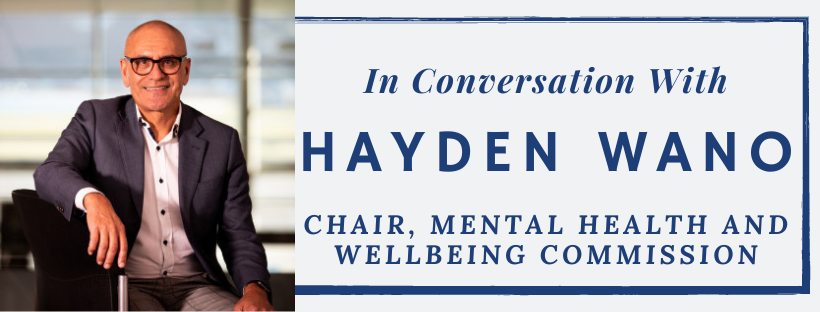In Conversation with Hayden Wano, Chair, Mental Health and Wellbeing Commission
27 Oct 2021

This month was World Mental Health Day, an important moment in time in mental health education, awareness and advocacy against social stigma.
Taking a longer-term view however we spoke with Hayden Wano (Taranaki, Te Atiawa, Ngāti Tama, Ngāti Awa), Chair of the newly established Mental Health and Wellbeing Commission Aotearoa New Zealand.
Tēnā koe Hayden
In September 2021 the New Zealand government released Kia Manawanui Aotearoa, the long-term pathway to mental wellbeing, which was welcomed by the Mental Health and Wellbeing Commission.
What about the plan has particular resonance for the Commission?
The Commission supports Kia Manawanui and Government’s continued commitment to drive change and deliver on its obligation to He Ara Oranga.
Kia Manawanui sets out sequenced actions over a ten-year period and takes a holistic view of mental wellbeing. The pathway’s approach is based on collaboration, sustained effort, and long-term investment to drive system change and to create new and different approaches to supporting mental wellbeing.
The Commission has been calling for a clear implementation plan for the direction set by He Ara Oranga and wants to see five critical areas prioritised:
- Upholding Te Tiriti o Waitangi and improving outcomes for Māori, including community-led design of kaupapa Māori services that are by Māori, for Māori
- Working with people with lived experience of mental distress and addiction to increase access and expand choice so people can recover from mental distress and addiction in their local communities
- Increasing equity for priority populations that we know disproportionately experience mental distress and addiction
- Working alongside people with lived experience of mental distress to repeal and replace the Mental Health Act – ensuring that all legislation upholds people’s human rights and meets New Zealand’s obligations under international conventions and treaties
- Maintaining a holistic view of wellbeing that acknowledges the impact of social and economic factors on people’s wellbeing, such as poverty, poor housing, discrimination, and other forms of disadvantage.
Broadly speaking, what is the Commission’s role in bringing it to life?
Kia Manawanui is an important step forward in transforming our mental health and addiction system and gives the Commission a benchmark from which we can monitor progress.
We are kaitiaki of mental health and wellbeing, working towards long-term transformation of the mental health, addiction, and wellbeing systems in Aotearoa.
We see ourselves as the eyes and ears of the people, amplifying the voices of our communities, and reflecting those views back to government. We bring focus to areas where meaningful action can be taken.
We will be publishing a report on wellbeing and a report on the mental health and addiction system before the end of the year and will use our findings to help drive system change.
Through our He Ara Āwhina (pathways to support) framework, we will highlight what is working well and bring people together so that new solutions and services can be developed in local communities.
Upholding Te Tiriti o Waitangi and improving outcomes for Māori is understandably a key priority. Will the Commission have a particular strategy to give effect to this?
As a Commission, we are grounding ourselves in Te Tiriti o Waitangi so that it informs our approach to everything we do. We are working to develop genuine partnerships with Māori.
Our strategy is strongly focused on addressing Inequity and improving wellbeing outcomes for Māori. We listen to and work alongside people who experience inequity, including tangata whai ora, those with lived experience of mental distress and/or addiction, and other priority groups.
Innovation is happening among kaupapa Māori service providers and we strongly support the use of matauranga Māori, te ao Māori, and rongoa Māori to define and support approaches to Māori wellbeing.
Covid-19 has had a profound impact on how we live, work and stay connected and for some it was been an incredibly isolating experience. Does the Commission have a role to play here?
COVID is probably one of the most significant life events many of us will experience in our lifetimes. The role of the Commission is to monitor and report on the wellbeing of everyone, but particularly those populations most at risk of poor mental health and wellbeing.
The research is telling us the impact of COVID-19 has not fallen evenly across our population in Aotearoa. For many of our vulnerable populations, inequalities have been exacerbated by COVID. The hardest hit were households whose incomes were under $30k.
We are prioritising our focus on areas where we can address inequity and have a significant positive impact on people’s wellbeing. The two reports we will publish before the end of the year will both include further comment on the impact of COVID-19 and we will continue to monitor the impact of the pandemic on mental wellbeing over time.

